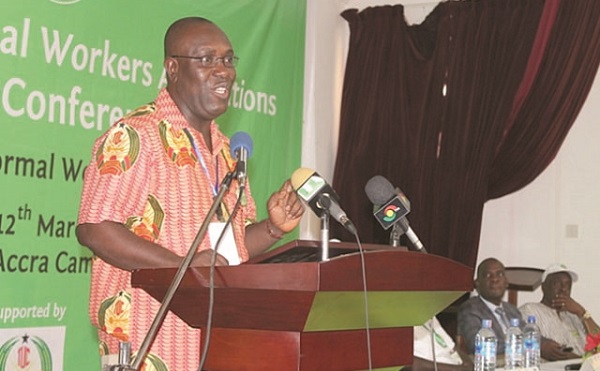
TUC urges government to raise tax-free threshold
The Ghana Trades Union Congress (TUC) has described the 2017 budget as an ambitious one that seeks to address the challenges confronting the country.
It further described it as a budget consistent with President Nana Addo Dankwa Akufo-Addo’s statement that he was in a hurry to return Ghana to a growth path that would bring prosperity to all Ghanaians, irrespective of their sex or location.
“The budget has set a growth target of 6.5 per cent. We believe the economy must be set on a growth path as soon as possible. But the fundamentals must be right to sustain rapid economic growth,” the TUC said in a statement on its view of the 2017 budget.
In its earlier submission, the TUC had called on the government to consider reducing personal income taxes (PAYE) and also suggested to it to raise the tax-free threshold to GH¢12,000 per annum (or GH¢1,000 per month).
“The government seems to have ignored this suggestion. The implication is that even minimum wage earners will pay income tax. We urge the government not to tax workers into poverty,” the statement said.
It also drew the government’s attention to the need for clear targets for employment creation to serve as a guide for assessing performance, sector by sector, region by region and district by district.
Employment
Welcoming the job creation initiatives in the budget, the TUC underscored the need to set clear employment targets to guide the government’s actions and pledged to work with the government and other stakeholders to support both the growth and jobs initiatives.
It stated that the country required a harmonious industrial atmosphere to advance the goals set out in the budget; the atmosphere also required all the social partners, particularly the government, to commit to and invest appropriately in the mechanisms for social dialogue in the true spirit of social partnership and mutual respect.
Before the budget was presented to Parliament, the TUC had submitted a 17-page budget proposal for the consideration of the government, in which it shared its perspectives on the economy in a number of areas.
The statement indicated that a careful reading of the budget indicated that the government recognised the employment challenge as such and had a clear intention to address it.
“We have taken note of the special programmes such as the one district, one factory, one village, one dam, small business development, planting for food and jobs, national entrepreneurship and innovation programme, one million dollar, one constituency, among other initiatives aimed at creating jobs for Ghanaians,” it said.
It said the initiative to undertake an employment audit of government-funded projects was very much appreciated and that the successful implementation of those initiatives would go a long way to alleviate the employment challenge which, in the view of the TUC, was the greatest challenge facing the country.
“We find these job creation initiatives very positive and refreshing. We will support the government to ensure the successful implementation of these employment creation initiatives,” the statement added.
Taxation
On taxation, the statement said one policy initiative that set the budget apart from previous budgets had to do with tax reliefs.
Consistent with the NPP’s manifesto to shift the focus of economic management from taxation to production, it pointed out that the 2017 budget had reduced or eliminated several taxes.
The government, the statement added, had also introduced tax credits and other incentives for establishments that employed young graduates from tertiary institutions and tax incentives for young entrepreneurs.
“We share the view that some of these taxes were a nuisance. The elimination of these taxes may spur the growth of businesses and raise the disposable incomes of Ghanaians,” it said.
Labour administration
The TUC, in its earlier submission, had called on the government to reverse the situation by investing in labour market institutions, including the National Labour Commission (NLC), the Labour Department, the Factories Inspectorate Department, the Fair Wages and Salaries Commission (FWSC) and the Ministry of Employment and Labour Relations.
Per the budget, the TUC said, for the 2017 fiscal year, the Ministry of Employment and all its agencies would receive GH¢60.7 million for their operations, which represented 0.001 per cent of the total Appropriation Bill and 0.04 per cent of the allocation to the Presidency.
“We cannot achieve industrial peace for economic growth if the government continues to treat the ministry responsible for employment and labour relations as a non-priority ministry,” the statement said.
Pensions
The TUC expressed concern that instead of the budget addressing the fundamental weaknesses in Ghana’s pension system, it only indicated that the supervisory responsibility of the National Pensions Regulatory Authority (NPRA) would move from the Ministry of Employment and Labour Relations to the Ministry of Finance and gave the justification for that change as “pensions are about finance”.
But the TUC, in the statement, explained that pension was not only about finance but more about the welfare of pensioners.
“With the transfer of the supervisory responsibility of NPRA from the Ministry of Employment and Labour Relations to the Ministry of Finance, we can only envisage more government interference in the pension system that may gravely affect the operations of SSNIT, NPRA and second tier pension schemes,” the statement added.
The TUC reiterated its opposition to the intended privatisation of the Electricity Company of Ghana (ECG) and urged the Akufo-Addo government to pull out of the Ghana Compact II programme of the Millennium Challenge Corporation.
